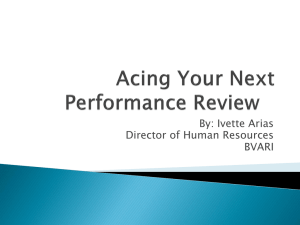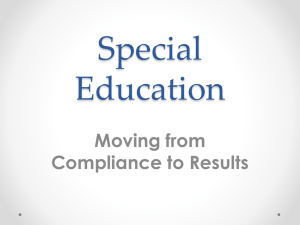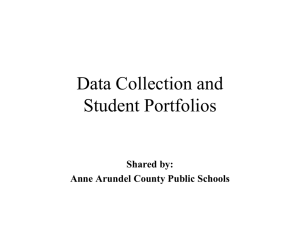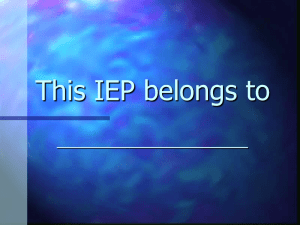Click to add title
advertisement
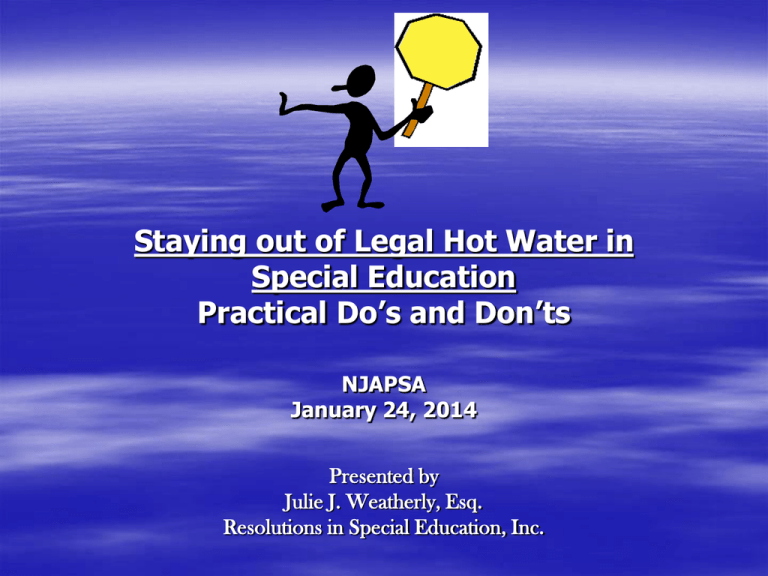
Staying out of Legal Hot Water in Special Education Practical Do’s and Don’ts NJAPSA January 24, 2014 Presented by Julie J. Weatherly, Esq. Resolutions in Special Education, Inc. Rowley’s “Process & Content” Standard for Determining FAPE 1. Has the IEP been developed in accordance with the Act’s procedures? (the process piece) 2. Is the IEP reasonably calculated to enable the child to receive educational benefit? (the content piece) The Do’s and Don’ts and Potential Missteps #1: DON’T Engage in Action that Appears to be a Predetermination of Placement or Somehow Denies Parental Input into Educational Decision-making. Potential Missteps: School members of the IEP Team meet prior to the IEP meeting, complete and sign the final IEP, and leave it to the special education teacher to present the IEP to the parent for signature that afternoon. School personnel arrive together at the annual IEP meeting with the IEP completed in full and ready to be signed by the parents. Potential Missteps (cont’d): During the IEP meeting, the regular education teacher exclaims, “but in our meeting yesterday, we decided that regular education participation is not appropriate.” The principal says during the IEP meeting, “but the Special Education Director already told us that we can only recommend ....” Potential Missteps (cont’d): The team recommends services, “but these will have to be approved by the Principal.” The IEP Chairperson begins the meeting by saying, “we are here today to develop an IEP for Billy to attend the self-contained class for LD students.” Potential Missteps (cont’d): The teacher simply decides not to invite parents to IEP meetings any more because the meetings “take way too long” when parents attend. The Do’s and Don’ts and Potential Missteps #2: DON’T Fail to Share all Relevant Educational and Evaluative Information with Parents. Potential Misstep: A couple of evaluations indicate some “characteristics of autism,” but the evaluators believe it would be best that it not be discussed at this juncture. The Do’s and Don’ts and Potential Missteps #3: DO Present Clear and Final Recommendations for Services. Potential Missteps: “We didn’t have an IEP in place by the beginning of the school year because all of our evaluations weren’t completed yet.” “But the parents and their attorney wouldn’t come to a meeting so that we could develop the IEP.” Potential Missteps (cont’d): “It is the Team’s recommendation that she be provided with three to five periods per day of special education services.” “She will receive these supports on an ‘as needed’ basis.” The Do’s and Don’ts and Potential Missteps #4: DO Have a Final IEP Proposed by the Beginning of the School Year. Potential Missteps: School personnel have held meetings with the parents but they weren’t pleasant, so there’s no need to have another meeting, since they’ll never accept anything the school system offers anyway. “Okay, so you don’t like the school’s first offer. Let’s discuss three other options for you to consider.” The Do’s and Don’ts and Potential Missteps #5: DON’T Fail to Hold an IEP Meeting at Least Annually. The Do’s and Don’ts and Potential Missteps #6: DO Make Educational Recommendations or Decisions Based Upon the Individual Needs of the Student. Potential Missteps: “Well, it may be true that he needs that, but I’ll be honest with you, we just don’t have that here.” “Our preschool program is offered for four days per week for a half day. That’s really all these young kids can handle.” Potential Missteps (cont’d): “But we always do it that way for our autistic students.” “We’ve never done that before and we’re not starting now!” Potential Missteps (cont’d): “My schedule won’t allow for that.” “My class doesn’t have those services.” “But all of our autistic students get that.” The Do’s and Don’ts and Potential Missteps #7: DON’T Make Decisions Based Solely Upon Cost. Potential Missteps: “I’m sorry, but that would just be too expensive and we just experienced severe budget cuts for special education services.” “That would be taking money away from the other students.” “Can you imagine how much that would cost if we did that for all of our students?” The Do’s and Don’ts and Potential Missteps #8: DON’T Fail to Notify Parents of Their Rights or to Give Them Prior Written Notice. Potential Missteps: The parents obviously do not agree with the school system’s program but have not been given a copy of their parent rights and, therefore, were not aware of their right to sue and challenge the program. The parent asks the special education teacher if her child could be evaluated for speech services. The teacher replies, “forget it, she’ll never qualify.” The Do’s and Don’ts and Potential Missteps #9: DO Have Required School Staff in Attendance at IEP Meetings. Potential Missteps: “Yes, I am the LEA Rep., but I don’t do special education. You’ll have to ask someone else, because I really know nothing about it.” “Sorry I’m an hour late, but the principal just told me I needed to be here because I’m the only regular education teacher left in the building. I’m not really sure what help I can give, since I don’t teach special education. So, can I go now?” Potential Missteps: “Because this child has been in private school, there is no teacher of the child to invite to the meeting.” “Though Johnny’s special education teacher couldn’t be here today, that’s okay because I’m sitting in and I am the special education director.” The Do’s and Don’ts and Potential Missteps #10: DON’T Fail to Allow for Participation of “Discretionary” Members Invited by Parents. Potential Missteps: “You can’t bring your attorney with you to the meeting.” “Sure, your next door neighbor can come but can’t say anything.” “We don’t consider a member of the press a knowledgeable person.” Potential Missteps (cont’d): “Sorry, you’re going to have to leave because we weren’t notified ahead of time that you were coming.” “Okay, since everyone is still here, let’s just take this to a vote since we can’t seem to agree.” “Since we can’t agree, I guess we can’t move forward.” The Do’s and Don’ts and Potential Missteps #11: DON’T Fail to Make Recommendations Based upon Adequate Evaluations. Potential Missteps: “We understand, Mom, that you think he may be disabled, but let’s just wait and see how he does before we obtain those records.” “I called the records custodian from the former district but haven’t heard back about the records that I requested.” The Do’s and Don’ts and Potential Missteps #12: DO Appropriately and Timely Respond to Requests for an Independent Educational Evaluation (IEE). Potential Missteps: “Sorry, the School System has already done an evaluation and that’s final.” “I’m not saying that we won’t pay for it, but I’m not saying that we will either.” The Do’s and Don’ts and Potential Missteps #13: DO Include Measurable Goals in the IEP and Measure Them! The Do’s and Don’ts and Potential Missteps #14: DON’T Make Vague or Generalized Recommendations Regarding Least Restrictive Environment (LRE). Potential Missteps: The school team begins its consideration of placement in a selfcontained environment first and moves backward along the continuum. The school team moves too quickly along the continuum in making its determination, skipping less restrictive options in its consideration. Potential Missteps: The IEP states that a separate school was chosen because the “parent wants it” or “the student’s needs are too severe to be met outside of a special school.” The IEP Team writes that the student needs to be in a separate class for students with disabilities because it would be “best” or “better” for the student. The Do’s and Don’ts and Potential Missteps #15: DON’T Be Overly Specific and Include Unnecessary Additions, Details or “Promises” in IEPs. Potential Missteps: School personnel are convinced by the parent’s advocate that the teacher’s daily schedule must be written into the IEP. School personnel comply with the attorney’s request to write in the IEP that Barbara Smith will be the student’s teacher and that all teachers will use the Orton-Gillingham method for instruction in reading. Potential Missteps (cont’d): The IEP Team complies with the parent advocate’s request to write into the IEP that Michael will be on the Varsity Football Team in order to address his socialization and communication goals. The Do’s and Don’ts and Potential Missteps #16: DO Appropriately Address the Need for Extended School Year Services (ESY). Potential Missteps: “Of course we provide ESY here, since anyone can participate in summer school.” “Our ESY program begins on June 16 and ends on July 19 this summer.” “Sorry, we no longer have ESY services because our school board cut the summer school program.” Potential Missteps (cont’d): “But all of our LD students get ESY in the form of home packets.” “Because your child is only mildly LD, we know he won’t qualify for ESY, so we don’t need to address it. Only our severe and profound students get ESY.” “It is clear that he needs ESY services in order to continue to progress over the summer or at least to maintain the skills he has right now.” The Do’s and Don’ts and Potential Missteps #17: DON’T Fail to Address Transition Services. Potential Missteps: “Since the folks from Voc. Rehab. didn’t show up today, I guess we can’t address transition services.” “Thank goodness we don’t have to worry with transition services, since she’s only fourteen.” “I think it would be better if he didn’t attend his own IEP meeting. He might not be able to handle it.” The Do’s and Don’ts and Potential Missteps #18: DON’T Refuse to “Consider” Independent Evaluative Information Brought in by the Parents. Potential Misstep: “This guy is a ‘quack’ and we’re not even going to consider this report.” The Do’s and Don’ts and Potential Missteps #19: DO Address Behavioral Strategies or Interventions as Part of the IEP. Potential Misstep: “Since she’s not behaviorally or emotionally disabled, we don’t need to address behavioral strategies for her as part of the IEP.” The Do’s and Don’ts and Potential Missteps #20: DON’T Inappropriately Change the Placement of a Student through the Use of Suspension/Expulsion/Other Disciplinary Removal. Potential Missteps: “This is not a suspension…just keep her home for five days for a ‘cool-off’ period.” “This is not a suspension, you just can’t come back without your Ritalin.” “Don’t come back without a psychiatric evaluation.” The Do’s and Don’ts and Potential Missteps #21: DON’T Fail to Develop a Plan to Ensure the Provision of Services in the IEP. Potential Missteps: “Oh, I didn’t even know she was a special education student.” “Nobody told us that she needed transportation on Monday morning.” “She has a behavior management plan? Why didn’t someone tell me?” The Do’s and Don’ts and Potential Missteps #22: DON’T Create Unnecessary Educational Records. Potential Missteps: “I didn’t know that the parent was entitled to see my personal file.” “I forgot to mention that the parent and I have been emailing each other for years.” “You mean to tell me that the parent can get copies of my emails to other staff members? The Do’s and Don’ts and Potential Missteps #23: DO Take Every Report of Harassment/Bullying Seriously. Potential Missteps: “Middle school girls just bully each other. There’s nothing I can do about it.” “I think we need to move him to a more restrictive setting, so he can be protected from the bullies.” Behavioral/Attitudinal Missteps #1: See no Evil, Hear no Evil, Speak no Evil. #2: Avoid the Temptation to Unleash your Inner Attorney Behavioral/Attitudinal Missteps #3: Ditto with your Inner Physician. “Well, if you ask me, it seems obvious that your child has ADD, ODD and OCD. I would suggest that you take him to the doctor so that we can develop a plan for him and he can be put on medication. In fact, here’s the card of someone I know who can do the evaluation.” Behavioral/Attitudinal Missteps #3: Ditto with your Inner Judge. “It is my feeling that….” “It seems to me that….” “I just don’t think he can do that.” Behavioral/Attitudinal Missteps #5: Just Breathe! #6: Just Accept It: “No Good Deed Goes Unpunished.” Thanks for having me today! Thank you for all you do!

